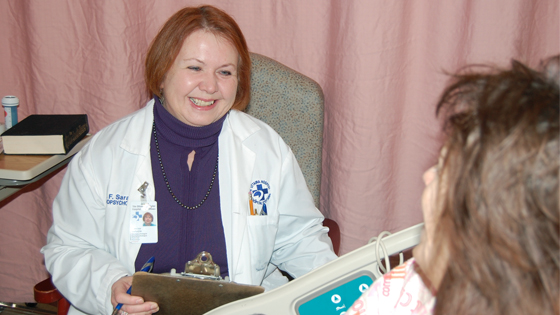
Hearts usually take centre stage in the month of February, but the mind is just as important! Celebrate Psychology Month by learning more about what members of the Psychology Department at The Ottawa Hospital (TOH) do every day.
At TOH, psychologists work as members of inter-professional teams to provide assessment, diagnostic, consultation and treatment services to patients and their families. Psychology services are offered in four practice areas.
1. Neuropsychology
Neuropsychologists offer assessment, diagnosis and treatment services to patients with suspected brain dysfunction or cognitive impairments. They assist the patient, family and team in planning treatment, discharge, level of care and rehabilitation, as well as decisions about resuming previous activities (work, school, driving, etc.). Treatment involves providing information about brain dysfunction and cognitive impairments, and developing remediation strategies and behavioural and cognitive management approaches to maximize quality of life.
TOH neuropsychology services are delivered across all inpatient services at the General and Civic campuses. The Shared Mental Health Care Program and the Champlain District Regional First Episode Program offer neuropsychology services in the community. At The Ottawa Hospital Rehabilitation Centre (TOHRC) and The Robin Easey Centre, community-based life skills instruction, education and cognitive rehabilitation services are provided to adults with a brain injury.
2. Rehabilitation Psychology
At TOHRC, rehabilitation psychologists provide inpatient and outpatient services to adults who have physical disabilities, chronic or acute medical illnesses, traumatic injuries and mobility impairments. TOHRC is a regional centre offering services across three clinical care streams: neuromuscular (such as spinal cord injury, multiple sclerosis, cerebral palsy, spina bifida and other complex neurological conditions), locomotor (amputations, chronic pain, respiratory disorders, multiple trauma, etc.) and acquired brain injury.
As part of the rehabilitation team, psychologists help patients to adjust and adapt to disability and to regain their independence. They address the psychological challenges (for example anxiety, depression, grief, trauma, brain impairments) that can arise from the patients’ conditions and can affect their ability to work toward their rehabilitation, vocational and personal goals.
3. Health Psychology
Health psychologists work with patients and health-care teams to help patients manage the impact of acute and chronic illness. They work with patients to prepare them for their medical treatment and to follow their medical treatment plans. They also develop and assess health promotion programs (e.g. programs to help people quit smoking). They provide services to TOH patients experiencing a range of conditions, such as cancer, chronic infectious diseases, complicated pregnancies, cardiac problems and surgery for high-risk obesity.
Patients may also suffer from other problems, sometimes as a result of their medical situation (e.g. pain, loss of fertility, fear of cancer returning) and sometimes more longstanding (e.g. history of depression, family issues). Such problems can complicate adjustment to illness and treatment. Health psychologists help patients better understand and manage their medical conditions and cope in healthier ways.
4. Clinical Psychology
Clinical psychologists help patients understand and manage behavioural, emotional and thought disorders and promote psychological well-being. They conduct psychological and diagnostic assessments, make treatment recommendations and provide individual and group therapy, as well as family interventions.
Clinical psychology services are provided to adult patients of the Mental Health and Outpatient Programs in Eastern Ontario through the following clinics/programs: Urgent Consultation Clinics, Perinatal Mental Health, Dialectical Behaviour Therapy, Eating Disorders Program, On Track First Episode Psychosis Program and Shared Care Program.
Additional areas of competencies are recognized by the College of Psychologists of Ontario (CPO), and descriptions can be found on the CPO website (www.cpo.on.ca). Many Psychologists, holding competencies in the above described areas also practice in the community and their contact information can be found on the searchable directory of the CPO.
Charles Leclerc, Ph.D., C.Psych.,
Neuropsychologist, The Ottawa Hospital
On behalf of the members of the Department of Psychology

Support patient care and research at
The Ottawa Hospital


 To reset, hold the Ctrl key, then press 0.
To reset, hold the Ctrl key, then press 0.